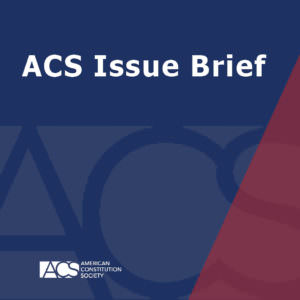Citizens United: The Aftermath
Former Brennan Center Constitutional Fellow

ACS is pleased to distribute “Citizens United: The Aftermath”, an Issue Brief by Monica Youn, Counsel at the Brennan Center for Justice at New York University Law School. In this Issue Brief, Ms. Youn examines the political impact of the Supreme Court's January 21, 2010 decision in Citizens United v. Federal Election Commission and outlines potential responses that, the author contends, "would buttress existing campaign finance safeguards from further attacks and mitigate some of the harmful effects of [the decision]." In Citizens United, the Court held that limitations on corporate funding of independent political broadcasts in candidate elections violate the First Amendment, striking down a significant portion of the Bipartisan Campaign Finance Reform Act. Ms. Youn contends that the 5-4 decision represents an undermining of precedent with potentially grave consequences:
"By holding, for the first time, that corporations have the same First Amendment rights to engage in political spending as people, the Supreme Court re-ordered the priorities in our democracy -- placing special interest dollars at the center of our democracy, and displacing the rightful role of voters. By holding, for the first time, that corporations have the same First Amendment rights to engage in political spending as people, the Supreme Court re-ordered the priorities in our democracy-placing special interest dollars at the center of our democracy, and displacing the rightful role of voters."
Ms. Youn proposes a variety of responses to the decision. In the short term, the author recommends a legislative response that includes enactment of stop-gap measures (such as shareholder consent and increased corporate disclosure requirements) and larger structural reforms (such as public financing and voter registration modernization). However, in the longer term, Ms. Youn recommends closer attention to the Judiciary and judicial nominations:
"[I]n the long term, reclaiming the First Amendment for the voters will be the best weapon against those who seek to use the First Amendment for the good of the few, rather than for the many. Judges whose conception of the First Amendment takes account of the interests of voters can speed this process. As the nation seeks a successor to Justice Stevens, we hope that his successor advances a vision of a democratic, deliberative, and voter-centric First Amendment."
Read the full Issue Brief here: Citizens United: The Aftermath
